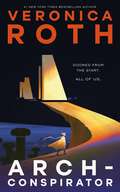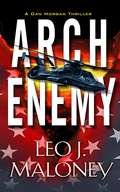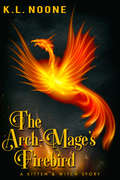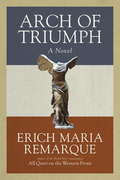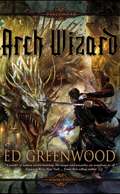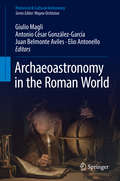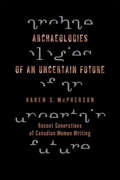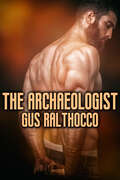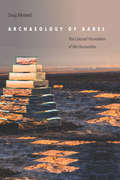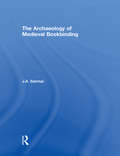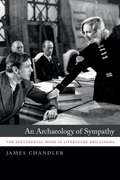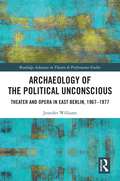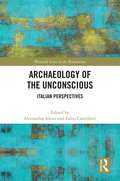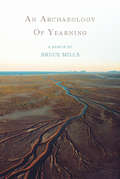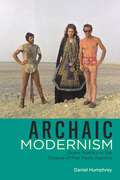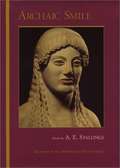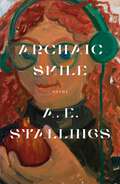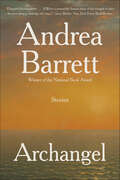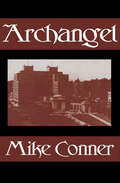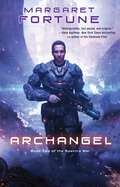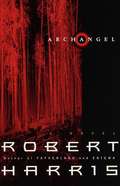- Table View
- List View
Arch-Conspirator
by Veronica RothIn this gripping and atmospheric reimagining of Antigone, #1 New York Times bestselling author Veronica Roth reaches back to the root of legend and delivers a world of tomorrow both timeless and unexpected.“I’m cursed, haven’t you heard?”Outside the last city on Earth, the planet is a wasteland. Without the Archive, where the genes of the dead are stored, humanity will end.Antigone’s parents—Oedipus and Jocasta—are dead. Passing into the Archive should be cause for celebration, but with her militant uncle Kreon rising to claim her father's vacant throne, all Antigone feels is rage.When he welcomes her and her siblings into his mansion, Antigone sees it for what it really is: a gilded cage, where she is a captive as well as a guest.But her uncle will soon learn that no cage is unbreakable. And neither is he.“Roth is a masterful conjurer, summoning both classic myth and visceral dystopia to weave a breathtaking tale of love, avarice, and the timeless desire for revenge.” — Ryka Aoki, bestselling author of Light From Uncommon StarsAt the Publisher's request, this title is being sold without Digital Rights Management Software (DRM) applied.
Arch Enemy (A Dan Morgan Thriller #4)
by Leo J. Maloney"Maloney is the new master of the modern spy game."--Mark SullivanFrom real-life Black Ops veteran Leo J. Maloney--author of Twelve Hours and Black Skies--comes an electrifying novel of global terror that will enthrall readers right until the stunning climax . . . Arch EnemyThe world is descending into chaos--and CIA warhorse Dan Morgan, after nearly losing his head on a covert mission in Colombia, knows the worst is yet to come. Frightened employees of the enigmatic government contractor Acevedo International are mysteriously dying. Morgan's own daughter finds herself lured into the violent world of college extremists. And a ruthless enemy that has long bided it's time is prepared to strike at the very heart of America's intelligence and anti-terrorism infrastructure. Morgan and Zeta Division may be the only chance not for victory, but survival . . . Praise for Leo J. Maloney and His Novels "Fine writing and real insider knowledge."--Lee Child "Everything a thriller reader wants."--Ben Coes "Taught, tense, and terrifying!"--Hank Phillippi Ryan "A ripping story!"--Meg Gardiner "Rings with authenticity."--John Gilstrap
The Arch-Mage's Firebird
by K. L. NooneThomas East was meant to be the youngest Arch-Mage in history, a magical genius and a solver of problems. But he hadn’t expected quite so many problems -- not to mention the endless meetings, bureaucracy, and political negotiations. So he’s currently hiding in a sleepy California seaside town, working in an ice cream parlor and avoiding everyone he’s let down ... until a firebird in need of rescue crashes into his shop.Nicholas Incandesco has far too many problems. He’s a firebird, a shapeshifter, and a power source, and a lot of magicians could use someone with his gifts. He’s also technically a murder suspect with two magical bounty hunters on his trail. He just wants someplace safe to land, and the attractive witch behind the ice cream counter might offer a sweet refuge.This encounter might be exactly what both Nicholas and Tom need to find themselves ... and rescue each other.
Arch Of Bone
by Jane Yolen Ruth SandersonContinuing the story from where Moby Dick left off, this compelling boyhood adventure, penned by beloved author Jane Yolen (Owl Moon), hearkens to timeless coming of age tales of yore. Lovingly illustrated by Ruth Sanderson, the journey of a boy and his dog comes to life on the page, renewing the joy of a classic tale.
Arch of Triumph
by Denver Lindley Walter Sorell Erich Maria RemarqueThe evocative story of a man without a country, Arch of Triumph is a World War II-era classic from the author of All Quiet on the Western Front. It is 1939. Despite a law banning him from performing surgery, Ravic--a German doctor and refugee living in Paris--has been treating some of the city's most elite citizens for two years on the behalf of two less-than-skillful French physicians. Forbidden to return to his own country, and dodging the everyday dangers of jail and deportation, Ravic manages to hang on--all the while searching for the Nazi who tortured him back in Germany. And though he's given up on the possibility of love, life has a curious way of taking a turn for the romantic, even during the worst of times. "The world has a great writer in Erich Maria Remarque. He is a craftsman of unquestionably first rank, a man who can bend language to his will. Whether he writes of men or of inanimate nature, his touch is sensitive, firm, and sure."--The New York Times Book ReviewFrom the Trade Paperback edition.
Arch Wizard (The Falconfar Saga, Book Two)
by Ed GreenwoodHaving been drawn into a fantasy world of his own creation, Rod Everlar continues his quest to defeat the corruption he has discovered within. He sets off in pursuit of the dark wizard Malraun, only to find that he has raised an army of monsters and mercenaries.
Archaeoastronomy in the Roman World (Historical & Cultural Astronomy)
by Giulio Magli Antonio César González-García Juan Belmonte Aviles Elio AntonelloThis book explores the insights that Cultural Astronomy provides into the classical Roman world by unveiling the ways in which the Romans made use of their knowledge concerning the heavens, and by shedding new light on the interactions between astronomy and heritage in ancient Roman culture. Leading experts in the field present fascinating information on how and why the Romans referred to the sky when deciding upon the orientation of particular monuments, temples, tombs and even urban layouts. Attention is also devoted to questions of broader interest, such as the contribution that religious interpretation of the sky made in the assimilation of conquered peoples.When one considers astronomy in the Roman world it is customary to think of the work and models of Ptolemy, and perhaps the Julian calendar or even the sighting of the Star of Bethlehem. However, like many other peoples in antiquity, the Romans interacted with the heavens in deeper ways that exerted a profound influence on their culture. This book highlights the need to take this complexity into account in various areas of research and will appeal to all those who wish to learn more about the application of astronomy in the lives and architecture of the Romans.
Archaeologies of an Uncertain Future
by Karen McphersonIn Archaeologies of an Uncertain Future, McPherson explores the memory work, alternative historiographies, and feminist aesthetics by which women writers revisit the past and reimagine the future. Grounded within critical discourses across many discplines, McPherson's analysis engages contemporary discussions about autobiographical genres, post-modern historiographies, memoirs, and literary genealogies.
Archaeologies of an Uncertain Future: Recent Generations of Canadian Women Writing
by Karen McPhersonIn Archaeologies of an Uncertain Future, McPherson explores the memory work, alternative historiographies, and feminist aesthetics by which women writers revisit the past and reimagine the future. Grounded within critical discourses across many discplines, McPherson's analysis engages contemporary discussions about autobiographical genres, post-modern historiographies, memoirs, and literary genealogies.
The Archaeologist
by Gus RalthoccoLeopold is an archaeologist working in Malta over the summer alongside students from a visiting university, and Anton, the translator who came to help out. At the start, Anton shares his desire for Leopold. They promise to keep in touch, but Leopold loses his phone, and Anton spirals from low self-esteem.They reunite through Leopold’s brother, who manages to track down Anton after he realizes Leopold had someone on his mind. When the two meet again, they realize the moment they had together was incredible for both of them and the spark is still alive, but if they want to have a relationship, they need more than that.Do Leopold and Anton have what it takes to stay together?
Archaeology of Babel: The Colonial Foundation of the Humanities
by Siraj AhmedFor more than three decades, preeminent scholars in comparative literature and postcolonial studies have called for a return to philology as the indispensable basis of critical method in the humanities. Against such calls, this book argues that the privilege philology has always enjoyed within the modern humanities silently reinforces a colonial hierarchy. In fact, each of philology's foundational innovations originally served British rule in India. Tracing an unacknowledged history that extends from British Orientalist Sir William Jones to Palestinian American intellectual Edward Said and beyond, Archaeology of Babel excavates the epistemic transformation that was engendered on a global scale by the colonial reconstruction of native languages, literatures, and law. In the process, it reveals the extent to which even postcolonial studies and European philosophy—not to mention discourses as disparate as Islamic fundamentalism, Hindu nationalism, and global environmentalism—are the progeny of colonial rule. Going further, it unearths the alternate concepts of language and literature that were lost along the way and issues its own call for humanists to reckon with the politics of the philological practices to which they now return.
The Archaeology of Medieval Bookbinding
by J.A. SzirmaiIn the past, studies of the history of bookbinding were mainly concerned with the exterior decoration. This book focuses attention primarily on the physical aspects of the binding and its construction principles. It is an expanded version of a series of lectures delivered by the author while Visiting Professor at the University of Amsterdam in 1987, supplemented with the results of ten years of intensive research in major libraries on the Continent, the United Kingdom and the USA. It surveys the evolution of binding structures from the introduction of the codex two thousand years ago to the close of the Middle Ages. Part I reviews the scanty physical evidence from the Mediterranean heritage, the early Coptic, Islamic and Ethiopian binding structures and their interrelation with those of the Byzantine realm. Part II is devoted to a detailed analysis of Western binding techniques, distinguishing the carolingian, romanesque and gothic wooden-board bindings as the main typological entities; their structure and function is compared with those of contemporary limp bindings. The book is illustrated with over 200 drawings and photographs and contains a comprehensive bibliography.
An Archaeology of Sympathy: The Sentimental Mode in Literature and Cinema
by James ChandlerIn the middle of the eighteenth century, something new made itself felt in European culture—a tone or style that came to be called the sentimental. The sentimental mode went on to shape not just literature, art, music, and cinema, but people’s very structures of feeling, their ways of doing and being. In what is sure to become a critical classic, An Archaeology of Sympathy challenges Sergei Eisenstein’s influential account of Dickens and early American film by tracing the unexpected history and intricate strategies of the sentimental mode and showing how it has been reimagined over the past three centuries. James Chandler begins with a look at Frank Capra and the Capraesque in American public life, then digs back to the eighteenth century to examine the sentimental substratum underlying Dickens and early cinema alike. With this surprising move, he reveals how literary spectatorship in the eighteenth century anticipated classic Hollywood films such as Capra’s It Happened One Night, Mr. Deeds Goes to Town, and It’s a Wonderful Life. Chandler then moves forward to romanticism and modernism—two cultural movements often seen as defined by their rejection of the sentimental—examining how authors like Mary Shelley, Joseph Conrad, James Joyce, and Virginia Woolf actually engaged with sentimental forms and themes in ways that left a mark on their work. Reaching from Laurence Sterne to the Coen brothers, An Archaeology of Sympathy casts new light on the long eighteenth century and the novelistic forebears of cinema and our modern world.
Archaeology of the Political Unconscious: Theater and Opera in East Berlin, 1967–1977 (ISSN)
by Jennifer WilliamsThis book investigates the aesthetic and political dialectics of East Berlin to argue how its theater and opera stages incited artists to act out, fuel, and resist the troubled construction of political legitimacy.This volume investigates three case studies of how leading East Berlin stages excavated fragmentary materials from Weimar dramatist Bertolt Brecht’s oeuvre and repurposed them for their post‑fascist society: Uta Birnbaum’s 1967 Man Equals Man at the Berliner Ensemble, Joachim Herz’s 1977 Rise and Fall of the City of Mahagonny at the Komische Oper, and Heiner Muller’s own productions of his trailblazing plays. In each instance, reused theatrical artifacts dialectically expressed the contradictions inherent in East German political legitimacy, at once amplifying and critiquing it. Illuminated by original archival research and translations of letters and artistic ephemera published in English for the first time, and engaging with alternative East German feminist epistemologies, this book’s critical investigation of culture and political legitimacy in the shadow of Germany’s fascist past resonates beyond the Iron Curtain into the twenty‑first century. Its final chapter examines how performative artifacts influence the process of political legitimation in more recent history, ranging from Checkpoint Charlie tourism to the January 6, 2021 US insurrection.This study will be of great interest to students and scholars in theater and performance studies, art history, musicology, German studies, anthropology, and political science.
Archaeology of the Unconscious: Italian Perspectives (Warwick Series in the Humanities)
by Alessandra Aloisi Fabio CamillettiIn reconstructing the birth and development of the notion of ‘unconscious’, historians of ideas have heavily relied on the Freudian concept of Unbewussten, retroactively projecting the psychoanalytic unconscious over a constellation of diverse cultural experiences taking place in the eighteenth and nineteenth centuries between France and Germany. Archaeology of the Unconscious aims to challenge this perspective by adopting an unusual and thought-provoking viewpoint as the one offered by the Italian case from the 1770s to the immediate aftermath of WWI, when Italo Svevo’s La coscienza di Zeno provides Italy with the first example of a ‘psychoanalytic novel’. Italy’s vibrant culture of the long nineteenth century, characterised by the sedimentation, circulation, intersection, and synergy of different cultural, philosophical, and literary traditions, proves itself to be a privileged object of inquiry for an archaeological study of the unconscious; a study whose object is not the alleged ‘origin’ of a pre-made theoretical construct, but rather the stratifications by which that specific construct was assembled. In line with Michel Foucault’s Archéologie du savoir (1969), this volume will analyze the formation and the circulation, across different authors and texts, of a network of ideas and discourses on interconnected themes, including dreams, memory, recollection, desire, imagination, fantasy, madness, creativity, inspiration, magnetism, and somnambulism. Alongside questioning pre-given narratives of the ‘history of the unconscious’, this book will employ the Italian ‘difference’ as a powerful perspective from whence to address the undeveloped potentialities of the pre-Freudian unconscious, beyond uniquely psychoanalytical viewpoints.
An Archaeology of Yearning
by Bruce MillsDigging into vivid moments within the metaphor of archaeology, Bruce Mill's remarkable memoir maps the artifacts of life as a father of a boy with autism, and as a boy himself growing up in rural Iowa. An Archaeology of Yearning is not ultimately about autism; instead it reaches into the world of human connection and illuminates how storytelling and an understanding of language keep that connection alive.On some nights, I awake as if in a cave and think of the future. Mary and I will exist as memories: a quick glimpse of arms reaching toward another's shoulders or face, an image of a hand upon a book, the scent of our bodies after the sweat of sleep, the tone of our young and old voices calling our daughter or son from distant rooms or down a stair.Eventually I arrive on the image of my son, in some new home. No matter how much I have written or catalogued or kept in images, I know that the site of his life and mine will inevitably remain fragments and that only a visitor can bring us to life.Bruce Mills has published scholarly books and articles on nineteenth-century American writings and co-edited a collection of essays by siblings of those on the autism spectrum. His creative nonfiction has appeared in The Georgia Review and New England Review. He teaches in the English Department at Kalamazoo College.
Archaic Modernism: Queer Poetics in the Cinema of Pier Paolo Pasolini (Queer Screens)
by Daniel HumphreyIn Archaic Modernism, Daniel Humphrey offers the first book-length, English-language examination of three adaptations of Greek tragedy produced by the gay and Marxist Italian filmmaker Pier Paolo Pasolini: Oedipus Rex (1967), Medea (1969), and Notes Towards an African Orestes (1970/1973). Considering Pasolini’s own theories of a "Cinema of Poetry" alongside Jacques Derrida’s concept of écriture, as well as more recent scholarship by queer theory scholars advocating for an antirelational and antisocial subjectivity, Humphrey maintains that Pasolini’s Greek tragedy films exemplify a paradoxical sense of "archaic modernism" that is at the very heart of the filmmaker’s project. More daringly, he contends that they ultimately reveal the queer roots of Western civilization’s formative texts. Archaic Modernism is comprised of three chapters. Chapter 1 focuses on Oedipus Rex, assessing both the filmic language employed and the deeply queer mythological source material that haunts the tragedy even as it remains largely at a subtextual yet palpable level. Chapter 2 extends and deepens the concept of queer fate and queer negativity in a scene-by-scene analysis of Medea. Chapter 3 looks at the most obscure of Pasolini’s feature length films, Notes Towards an African Orestes, a film long misunderstood as an unwitting failure, but which could perhaps best be understood as a deliberate, sacrificial act on the filmmaker’s part. Considering the film as the third in an informal, maybe unconscious, trilogy, Humphrey concludes his monograph by arguing that this "trilogy of myth" can best be understood as a deconstruction, gradually more and more severe, of three of the most important origin tales of Western civilization. Archaic Modernism makes the case that these three films are as essential as those Pasolini films more often studied in the Anglophone world: Mamma Roma, The Gospel According to Matthew, Teorema, The Trilogy of Life, and Salò, and that they are of continuing, perhaps even increasing, value today. This book is of specific interest to scholars, students, and researchers of film and queer studies.
Archaic Smile: Poems
by A. E. StallingsArchaic Smile, by A.E. Stallings, recipient of the 1999 Richard Wilbur Award, uniquely juxtaposes poetic meditations on mythological themes with poems about the everyday occurances of contemporary life -- such as losing an umbrella or fishing with one's father.
Archaic Smile: Poems
by A. E. StallingsA new edition of A. E. Stallings's first book of poems, which was awarded the Richard Wilbur Award. In Archaic Smile, by the Pulitzer Prize and National Book Critics Circle Award finalist A. E. Stallings, the poet couples poetic meditations on classic stories and themes with poems about the everyday, sometimes mundane occurrences of contemporary life (like losing an umbrella or fishing with one’s father), and she infuses the latter with the magic of myth and history. With the skill of a scholar and translator and the playful, pristine composition of a poet, Stallings bridges the gap between these two distant worlds.Stallings “invigorates the old forms and makes them sing” (Meryl Natchez, ZYZZYVA) in her poetry, and the scope and origins of her talents are on full display in the acclaimed author's first collection. The poems of Archaic Smile are sung with a timeless, technically impeccable, and utterly true voice.
Archaic Style in English Literature, 1590-1674
by Lucy MunroRanging from the works of Shakespeare, Spenser, Jonson and Milton to those of Robert Southwell and Anna Trapnel, this groundbreaking study explores the conscious use of archaic style by the poets and dramatists between 1590 and 1674. It focuses on the wide-ranging, complex and self-conscious uses of archaic linguistic and poetic style, analysing the uses to which writers put literary style in order to re-embody and reshape the past. Munro brings together scholarly conversations on temporality, memory and historiography, on the relationships between medieval and early modern literary cultures, on the workings of dramatic and poetic style, and on national history and identity. Neither pure anachronism nor pure nostalgia, the attempts of writers to reconstruct outmoded styles within their own works reveal a largely untold story about the workings of literary influence and tradition, the interactions between past and present, and the uncertain contours of English nationhood.
Archangel: Stories
by Andrea Barrett"Elegantly contemplative.…[O]ffers a powerfully human sense of the struggle it takes for new ideas to dislodge old ones." —Janet Maslin, New York Times Book Review Dramas both personal and cosmic unfold around five pivotal moments in the history of knowledge in this collection from the "genius enchantress" (Karen Russell) author of Ship Fever, winner of the National Book Award.A young boy comes of age amid an explosion of homespun investigations. A widowed science writer tries to reconcile the influence of emotion on scientific theory. A famous biologist finds himself outpaced by his students, even as he seeks to teach them. As the characters in this "elegant, thought-provoking" (Connie Ogle, Miami Herald) collection witness the world transform around them through groundbreaking discoveries—the flight of an early aeroplane, Darwin’s theory of evolution, developments in genetics and X-ray technology—they grapple with the thrill and loss that accompanies scientific progress, and the personal passions and impersonal politics that shape all human knowledge. Throughout these deftly plotted stories, Andrea Barrett weaves subtle connections among the tales within this collection and characters in her earlier works.
Archangel
by Mike ConnerFrom the book jacket: Archangel is set in an alternate universe Minneapolis, in the late 1920s, after a decade of devastating plague. Hun, a blood disease that appeared during World War I, ended the war and is killing more people every year. Like other great cities, Minneapolis is a shadow of its former self, isolated by the breakdown of civilization. Whites are dying while blacks are immune and trying to forge a new social compact in a radically changed society. And a mysterious woman calling herself "the Archangel" broadcasts the music of the jazz age-and the real, uncensored news-from a pirate radio station. Danny Constantine, a young newspaperman, discovers a weird series of murders that look like the work of a vampire. But in a world of bad news, even his own paper doesn't care to print his discovery. Danny has been alone in the world since his wife died of Hun, and his investigation becomes his personal crusade, involving him with an embittered black police officer, a doctor seeking a cure for the disease, and the social forces contending for power in the crumbling city- and finally, with the Archangel. Michael Conner has been building a reputation as one of the most talented younger writers in science fiction. His recent story, "Guide Dog," won the 1993 Nebula Award. Now Conner has written Archangel, his most powerful and intriguing work yet.
Archangel
by Mike ConnerNebula-award winning author Mike Conner presents a novel about a world that all of us can recognize, a world of what might have been. In Minneapolis in the 1930&’s, the deadly plague that ended the First World War is decimating the population. The only people who seem to be immune to its effects are black people. What does this mean for the future of the city—and of the nation? Young newsman Danny Constantine finds that not everyone is dying from the plague. He has discovered a series of bizarre deaths—murders that look like the work of a vampire. In these times of bad news, his own paper refuses to print the story and Danny must search for the truth on his own, except for a mysterious woman known only as archangel, who always seems to appear when needed most.
Archangel (Spectre War #2)
by Margaret FortuneArchangel is the second installment of the explosive, pulse-pounding Spectre War science fiction series.An enemy you can’t kill. A soldier who can’t fight. An interstellar war that can’t be won . . . until now. As a soldier of the Celestial Expanse, Guardian First Class Michael Sorenson knows better than anyone that when the Spectres invade, there are only two options. Run or die. However, his defensive war takes on a whole new spin when he’s recruited into Division 7, a Research & Development facility with the ultimate mission: to create a large-scale weapon that can kill Spectres en masse. Here Michael joins a team of military elite who have the daring—and dangerous—task of taking new weapons prototypes out into the field for testing on enemy troops. Yet the closer they come to developing a working WMD, the more it becomes clear: There’s a saboteur in R&D. With all signs pointing to a massive Spectre attack brewing on the horizon, the creation of a new weapons system yields an opportunity to end the threat once and for all. As the days count down toward its launch, Michael must hunt down the saboteur . . . before the saboteur hunts down him.
Archangel
by Robert HarrisOne night, Kelso is visited in his hotel room by an old NKVD officer, a former bodyguard of the secret police chief Lavrenty Beria. The old man claims to have been at Stalin's dacha on the night Stalin had his fatal stroke, and to have helped Beria steal the dictator's private papers, among them a notebook. Kelso decides to use his last morning in Moscow to check out the old man's story. But what starts as an idle inquiry in the Lenin Library soon turns into a murderous chase across nighttime Moscow and up to northern Russia--to the vast forests near the White Sea port of Archangel, where the final secret of Josef Stalin has been hidden for almost half a century.
